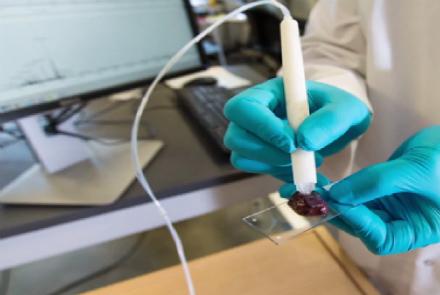Scientists have revealed how a novel device, much like a pen, can take just 10 seconds to detect cancerous tissue during surgery.
According to Medical News Today, scientists revealed in a new study the device, called MasSpec Pen, was highly accurate in detecting cancer in human tissue samples.
Study leader Livia Schiavinato Eberlin, of the University of Texas at Austin, and colleagues said the tool could vastly improve the accuracy of cancer surgery and help to reduce recurrence of the disease.
The researchers recently reported their findings in the journal Science Translational Medicine.
The state-of-the-art device works by identifying tissue metabolites that are unique to cancer cells, using a technique called mass spectrometry.
The team "trained" the software to distinguish between cancerous and non-cancerous molecular fingerprints by feeding it data from hundreds of healthy and cancerous human tissue samples, including tissue from the lung, breast, and ovary.
Once the device has assessed the tissue, it will flag the words "Normal" or "Cancer" on a computer screen.
When tested on 253 tissue samples from healthy patients and patients with cancer, the device took around 10 seconds to identify cancerous tissue, and it yielded 96.3 percent accuracy, 96.2 percent specificity, and 96.4 percent sensitivity.
Additionally, the MasSpec Pen was found to accurately detect cancer in live mouse models, without causing any damage to healthy tissue.
"What is incredible is that through this simple and gentle chemical process, the MasSpec Pen rapidly provides diagnostic molecular information without causing tissue damage," says Eberlin.
The researchers believe that their novel creation could help to improve outcomes for patients who undergo cancer surgery.
"If you talk to cancer patients after surgery, one of the first things many will say is 'I hope the surgeon got all the cancer out.' It's just heartbreaking when that's not the case," adds Eberlin.


